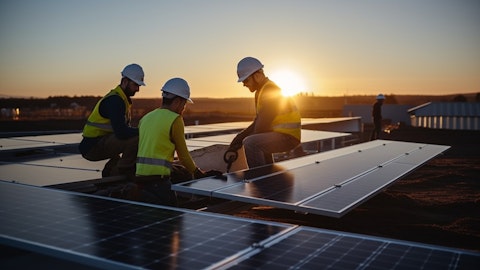Northwest Natural Holding Company (NYSE:NWN) Q1 2024 Earnings Call Transcript May 6, 2024
Northwest Natural Holding Company misses on earnings expectations. Reported EPS is $1.69 EPS, expectations were $1.82. NWN isn’t one of the 30 most popular stocks among hedge funds at the end of the third quarter (see the details here).
Operator: Hello and welcome to the NW Natural Holdings Company, Q1 2024 Earnings Call. My name is Natasha and I will be your moderator for today. [Operator Instructions] I now have the pleasure of handing you over to your host, Nikki. Nikki, please go ahead.
Nikki Sparley: Thank you, Natasha. Good morning and welcome to our first quarter 2024 earnings call. As a reminder, some things that will be said this morning contain forward-looking statements. They are based on management’s assumptions which may or may not occur. For a complete list of cautionary statements, refer to the language at the end of our press release. We expect to file our 10-Q later today. As mentioned, this teleconference is being recorded and will be available on our website following the call. Please note these calls are designed for the financial community. If you are an investor and have additional questions after the call, please contact me directly at 503-721-2530. News media may contact David Roy at 503-610-7157.
Speaking this morning are David Anderson, Chief Executive Officer; and Brody Wilson, CFO, Vice President, Treasurer and Chief Accounting Officer. David and Brody have prepared remarks and then will be available along with other members of our Executive Team to answer your questions. With that, I will turn it over to David.
David Anderson: Thanks, Nikki and good morning everyone. This morning I’ll walk through a few financial and economic indicators and some takeaways from our winter peak event that we experienced. Brody will go through the quarter’s results and then I’ll wrap up with an update on decarbonization activities in our water and renewables company. To begin with, our financial results are on track for the year and in line with our full-year guidance that we issued in February. We reported net income of $1.69 per share in the first quarter compared to net income of $2.01 per share for the same period last year. As discussed on the year-end call in February, results in 2024 reflect a combination of regulatory lag related to our capital investments and inflationary pressures.
It’s the reason we filed an Oregon general rate case at the end of 2023. First quarter of 2024 results included higher pension, depreciation and interest expense compared to the same period in 2023. Related to our gas utility service territory, despite seeing some signs of softening, Oregon’s unemployment rate remains low at 4.2%. Unemployment rates in our water service territories were as low as 3.2% at our Rose Valley utility, located just outside of Phoenix, Arizona. Single family building permits posted double-digit growth for five of the nine counties. Our water utility served for the 12-months ended March 2024 compared to the same period in 2023. Population growth in 2023 was as high as 4.7% in Texas, where our Blue Topaz Utilities are based and 2.1% growth in Yuma, Arizona, where our largest water utilities serve customers.
Collectively, our gas and water utility customer base grew 1.7% over the last 12 months. Essential energy service to our customers was at the forefront again this past winter. Frigid temperatures, severe wind and snow hit the Pacific Northwest region for about a week in January. Our region and nation were reminded once again of the critical life saving energy the natural gas system provides and the long term energy reliability benefits our system delivers to the region. Northwest Natural’s customers relied heavily on our system. We hit a new peak Day record on Saturday, January 13, delivering 8 million therms of natural gas to sales customers, that’s a 100,000 therms more than our previous record set in December ’22 and about double our average daily winter send out.
Mist, our on-system gas storage facility delivered a new record volume that same Saturday, providing essential support for our entire region’s electric and gas energy systems, throughout the event. I’m pleased to report that our employees rose to the occasion and ensured that our system performed well, supporting direct use of natural gas and appliances like gas fireplaces, water heaters, stoves and generators when the electric system was experiencing widespread power outages. During the highest energy use hour, Northwest Natural delivered 55% more energy than local electric providers combined. Despite decades of investment in renewables, the electric system for the United States sourced only 7% of its power that week from wind, solar and hydro.
Climate policies will only be successful if we as a modern society understand and acknowledge the essential role the gas system provides during these critical events. Our disciplined investments in the systems over many decades have resulted in the safe transportation of affordable energy to homes and businesses today. That’s why we believe that two integrated systems, gas and electric, each doing what they do best is the right solution. It’s a starting point for our climate strategy as we leverage our system, already in place, in new, innovative ways to continue driving down emissions even further. Voters in our service territory agree with us. We’ve surveyed voters the last five years, commissioning the research through a respected independent firm.
Time-and-time again, the data shows that voters want a diversified set of energy solutions, citing reliability and affordability concerns. For example, three out of four voters continue to view natural gas system as essential. This has consistently been the view for the past five years. With increasing concern about power outages, 81% of voters today say we need both electricity and natural gas to reliably meet the energy needs. We appreciate voters’ increasing understanding of the essential role the natural gas system plays in an affordable, reliable and decarbonized energy system. With that, let me turn over to Brody to cover the financial.
Brody Wilson: Thank you, David. And good morning, everyone. I’ll begin by discussing overall earnings drivers for 2024, highlights for the first quarter results and conclude with guidance for the year. As a reminder, Northwest Naturals’ earnings are seasonal with a majority of revenues and earnings generated in the first and fourth quarters during the winter heating months. Also, our segment reporting includes our natural gas distribution or NGD segment and other which includes our interstate storage services and asset management services, Northwest Natural Water, Northwest Natural Renewables and holding company expenses. Before I walk through detailed first quarter results, I wanted to outline a few of the financial themes for 2024.

As you may remember, 2024 is an investment year for us that is setting the stage for future growth. While we continue to maintain strong credit ratings, a solid balance sheet and an unchanged long-term earnings growth outlook, our earnings guidance for 2024 reflects a combination of lag related to our capital investments and inflationary pressures that we are experiencing simultaneously. Our gas utility is making necessary investments in safety, reliability and technology at record levels. The regulatory lag associated with these investments is exacerbated in 2024, due to the increased level of investment and the shorter live nature of high or higher depreciation expense associated with cybersecurity and technology assets. Second, our gas utility is contending with inflationary pressures on operating expenses primarily due to the renewal of several multi-year O&M contracts, higher personnel costs, the amortization of cloud computing technology investments and higher pension expenses.
Our team has instituted aggressive cost saving measures to do all we can to reduce costs and operate as efficiently as possible while maintaining a safe and reliable system. To resolve the regulatory lag, we filed a gas utility Oregon rate case late last year. We expect new rates will go into effect November 1st. Now, moving to the first quarter results. We reported net income of $63.8 million or $1.69 per share for the first quarter of 2024, compared to net income of $71.7 million or $2.01 per share for the same period in 2023. Lower earnings at our gas utility drove the year-over-year decline in results, which is primarily due to regulatory lag on investments and inflationary pressures we discussed earlier. Utility margin increased $0.5 million, primarily due to customer growth and the amortization of deferrals, partially offset by the effects of warmer weather and lower gains on gas costs.
Gas utility O&M decreased $0.3 million, reflecting lower benefit costs and cost saving measures. Utility depreciation and general taxes increased $2.1 million, other income declined $3.8 million, primarily driven by higher pension costs. And interest expense increased $1.5 million due primarily to incremental long term debt financing. Our other businesses provided a net loss of $1.9 million, which is an increase of $1.6 million compared to the same period last year, primarily due to lower asset management revenues. With the overall cost of capital increasing, we’ve remained disciplined in our approach to deploying capital. For 2024, cash provided by operating activities was $125 million. We invested $82 million into the business with the majority of the investments for safety and reliability projects in our regulated gas and water businesses.
These were planned and included in our rate case requests. Our objective remains to keep our balance sheet strong with ample liquidity. The company reaffirmed 2024 annual earnings guidance today for net income in the range of $2.20 to $2.40 per share. Guidance assumes continued customer growth, average weather conditions and no significant changes in prevailing regulatory policies, mechanisms or outcomes or significant changes in laws, legislation or regulations. In our earnings release, we have also provided our expectations regarding the quarterly distribution of consolidated earnings. We continue to target a long term earnings per share growth rate of 4% to 6% compounded annually from 2022 through 2027. With that, I’ll turn the call back over to David.
David Anderson: Thanks, Brody. Turning to our gas utility, we continue to work on decarbonization initiatives. Related to renewable natural gas, we issued a request for proposals in April, to solicit offtake bids, that RFP closes in mid-May. For hydrogen, we have several pilots in motion. First, our project with modern hydrogen has been commissioned and is actively capturing carbon from our pipeline through a pyrolysis process. This solid carbon is sequestered and can be used in secondary markets like asphalt or the production of tires. We’ll continue to test the equipment over the coming months to fully understand this technology. Next steps will include assessing applications for our industrial customers who are eager to explore cost-effective decarbonization solutions.
Right now, our hydrogen blending project at our Sherwood operations and training center is demonstrating that a 20% blend level can be used without issue. We’ve been at this for a few years now, testing hydrogen blends at different levels and all with positive results which is important data to help us prepare for future opportunities for broader system blending. As we reported last quarter, we’re also supporting a pilot project in Eugene, Oregon that will examine ground source heat pump systems coupled with natural gas backup heating. We view this as a great way to support peak heating needs while reducing emissions. Washington state policymakers think this too. In February of 2024, House Bill 2131 was passed, supporting utilities establishing thermal energy networks like ground source heat pumps with $25 million available to gas utilities to cover the incremental cost of the system.
I’m pleased to see this level of support in the Pacific Northwest as a proving ground for innovative energy solutions. We believe these kinds of hybrid solutions have great promise and we are excited to be at the forefront. We’ll keep you updated on our progress. Turning to Water. We continue to execute on our growth strategy while we continue to manage a robust acquisition pipeline. We are staying focused and disciplined as we seek the right opportunities to create value. In 2024, we’re also working hard to refresh rates at multiple water companies. So far, four rate cases are in process, including four — our largest utility in Arizona and we expect to file additional rate cases later this year. These cases are mainly related to capital investments as we continue to find these systems need substantial investments to meet current and increasing quality standards and to support customer growth.
Moving on to renewables. As you know, through that business, we’re focused on providing cost-effective solutions to help a variety of sectors decarbonize using existing waste streams and renewable energy sources. Our first project is an investment in two facilities with EDL, that is designed to convert landfill waste gases to renewable natural gas. Construction was completed on both facilities last year and the raw gas production is at the expected levels. However, there is a technical issue with the conditioning equipment. Our partners’ technical teams believe new equipment will resolve this issue and are installing that right now. Testing then will be completed and if everything goes according to plan, EDL expects both facilities to be online and ready to begin commercial operations later this summer.
Finally this morning, I’m proud of Northwest Natural Holdings being named one of 2024 World’s Most Ethical Companies by Ethisphere for the third year running. This reflects our longstanding commitment to leadership and business integrity through best-in-class ethics, compliance and governance practices. Northwest Natural Holdings is one of only eight honorees in the energy and utilities industry. In all, 136 honorees were recognized spanning 20 countries and 44 industries. In conclusion, your company is financially strong and will continue working on your behalf to execute on the opportunities across all of our businesses. So thanks for joining us this morning. And Natasha, when you’re ready, we’ll open it up for questions.
Operator: [Operator Instructions] We will take our first question from Selman Akyol of Stifel. Selman, your line is now open. Please go ahead.
See also 23 Most Profitable Stocks of the Last 12 Months and 10 Most Tax-Friendly States for Retirees: Some with No Property Tax.
Q&A Session
Follow Northwest Natural Gas Co (Old Filings) (NYSE:NWN)
Follow Northwest Natural Gas Co (Old Filings) (NYSE:NWN)
Receive real-time insider trading and news alerts
Selman Akyol: Thank you. Good morning.
David Anderson: Hey, Selman.
Selman Akyol: Looking forward to seeing you guys out at AGA. Just two quick questions for me since we’re going to be getting together, but just can we go back to the other income and expense? And I’m looking at this and probably for Brody, a loss of $1.1 million. Can you just go through that a little bit on what impacted that?
Brody Wilson: Sure. If you’re looking like quarter-over-quarter, or if you’re looking at the 12 months, there’s a couple of things hitting that line item. So on the 12 — rolling 12-months that you might see in the earnings release in that number would have been the gains we had in closing out the sale of our Gill Ranch settlement that we had hit us in Q2 of last year. And then on a year-over-year period here, some of those other income costs for us include some of the water operating costs that don’t fall into O&M can flow through there. So some of the costs around handling some of the water — wastewater there as well and then we have some pension costs flowing through that number as well. So I think the biggest movement quarter, if you do Q1 to Q1 is going to be pension driving that number for us this year. And we kind of highlighted that as one of the factors impacting overall earnings for 2024 is pension costs going up for the year.
Selman Akyol: Got you. So just thinking about that similar then into Q2 and Q3 before you get some rate relief in Q4.
Brody Wilson: I think that’s fair. Yeah.
Selman Akyol: Fair statement. Okay. All right, great. And then, David, for you. And I just want to — maybe you could just talk a little bit about how the conversations went with S&P and I guess the downgrade on the outlook. If you could just talk a little bit about that.
David Anderson: Yeah, I’ll probably turn it over to Brody. But I will tell you, our relationships with both agencies that we use S&P and Moody’s are good. We have very fulsome discussions with them at least twice a year and they’re in contact with Brody and Nikki on a regular basis. But Brody, why don’t I turn it over to you to give a little bit of the background on the move that S&P made at the holding company level.
Brody Wilson: Yeah, thanks for the question. So you’ll recall last year we got the holding company rated for the first time by S&P and at the time got an A plus rating at the holding company, which matched our gas utility and gave a negative outlook overall to both businesses. So they’ve been watching that. Our overall consolidated FFO to debt number was sort of at their threshold level right around that 13%. I think it fell slightly below on a consolidated basis at the end of last year. So they were looking at that closely. Ultimately, they decided to downgrade the consolidated holding company but held the gas utility steady and in fact, put the gas utility on stable outlook moving forward. So we maintained our A plus rating with S&P at the gas utility, they did drop the holding company down to A and kept it on a negative outlook.
And that’s really just the financial metric pressure that we have there with some of the debt at the holding company on a consolidated basis, but continue to have really good conversations with them, felt like their view on our gas utility was really strong and we saw that reflected in the stable outlook and the maintaining of the rating at the gas utility level.
David Anderson: I think it’s fair to say, it’s not unusual to have the holding company one notched below also.
Selman Akyol: Yeah. Okay, great. I appreciate that and look forward to seeing you guys here shortly.
David Anderson: Yeah. Thanks, Selman.
Operator: We have no further questions, so I would like to turn the call back to David.
David Anderson: Well, thank you, Natasha. And thank you, everybody, for joining us. And as Selman was just indicated here, in a couple of weeks, we’ll see hopefully a lot of you down in California at the American Gas Association’s financial forum. If you have any questions, reach out to Nikki. Otherwise, we look forward to seeing you there or catching up with you in the future. Have a great day, everybody.
Operator: This concludes today’s call. Thank you for joining. You may now disconnect your lines.
Follow Northwest Natural Gas Co (Old Filings) (NYSE:NWN)
Follow Northwest Natural Gas Co (Old Filings) (NYSE:NWN)
Receive real-time insider trading and news alerts





